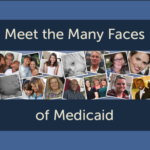Throughout Black History Month, we’re sharing stories from Providence caregivers who specialize in behavioral health care. We are also featuring student mental health advocates who are members of Work2BeWell’s National Student Advisory Council.

We spoke with Dominic about what inspired his passion for mental health advocacy and why he’s focused on reducing mental health stigma in Black communities.
What programs have you been involved with in your local community to raise awareness about mental health and reducing stigma as it relates to the Black community?
Mental health has always been a topic that I’m extremely passionate about. I serve as a junior commissioner on the Decatur Mayor’s Youth Council. One of our main goals is to raise awareness about mental health and to de-stigmatize mental health especially in minority communities and to build conversations around it. I’ve worked to coordinate roundtables and discussions regarding mental health to increase awareness and let youth know that it’s OK to talk about mental health and to seek help.
What inspired you to become a mental health advocate with a focus on reducing stigma in Black community?
Before I moved to Georgia, I spent several years living in Italy. When I moved to Georgia, I barely knew how to speak English, and I remember facing so much mockery due to my broken English. I also felt like I didn’t really belong and that caused a lot of mental health issues for me. There were not a lot of African American students at my elementary school when I moved back to the U.S. And while I was going through this, there weren’t really many resources that I could access. Luckily, I had an amazing teacher as well as an amazing counselor that helped me with the issues I was going through and with their help, I was able to thrive.
Going through these experiences and overcoming them made me want to give back and create awareness around mental health and well-being in the Black community. I aspire to be the representation that I never was able to see.
What advice would you give to a youth/teen who’s struggling with a mental health issue?
First, I would tell them don’t ever be afraid to ask for help. Asking for help, is one of the best decisions that I’ve ever made.
The second thing that I would share would be to seek out resources. I had an amazing counselor, but I also went online looking for resources. The free resources from Work2BeWell are very helpful. There is an entire section for justice, equity, diversity with information to gain greater understanding of why stigma exists in minority communities and how to be better equipped to address it and there is information about the role that advocacy and activism plays in mental health justice for BIYOC (Black, Indigenous and other Youth of Color) communities.
How do you Work2BeWell to support your mental health and well-being?
After a stressful day, and if it’s a Friday or Saturday night, I like to hang out with my friends and explore the city with them. I also love literature, and I like reading different book genres.
View and share resources that support mental health and well-being
Providence’s Well Being Trust recently updated its guide that includes resources that support mental health and well-being in Black communities.
Explore this curated collection of articles, guides, podcasts, and other resources – Prioritizing Black Mental Health: A guide to resources and support – Well Being Trust.
Read more feature stories in the Mental Health Spotlight Series: Prioritizing Mental Health Support in Black Communities
- Jayda Ward – A youth mental health advocate and member of Work2BeWell’s National Student Advisory Council
- Tendai Masiriri, PhD, LICSW, director of Behavioral Health for Providence South Puget Sound
- Divinity Star, LCSW, behavioral health specialist, Providence Facey Medical Group, in Pasadena, California
If you or someone you know is struggling or in crisis, help is available. Call or text 988 or chat 988lifeline.org.
The information on this website is not intended to be medical advice. Medical advice can only be provided by your personal health care provider.





